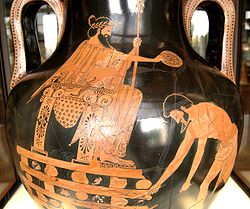
Croesus and Fate
Encyclopedia

Leo Tolstoy
Lev Nikolayevich Tolstoy was a Russian writer who primarily wrote novels and short stories. Later in life, he also wrote plays and essays. His two most famous works, the novels War and Peace and Anna Karenina, are acknowledged as two of the greatest novels of all time and a pinnacle of realist...
that is a retelling of a Greek legend, classically told by Herodotus
Herodotus
Herodotus was an ancient Greek historian who was born in Halicarnassus, Caria and lived in the 5th century BC . He has been called the "Father of History", and was the first historian known to collect his materials systematically, test their accuracy to a certain extent and arrange them in a...
, about the king Croesus
Croesus
Croesus was the king of Lydia from 560 to 547 BC until his defeat by the Persians. The fall of Croesus made a profound impact on the Hellenes, providing a fixed point in their calendar. "By the fifth century at least," J.A.S...
. It was first published in 1886 by Tolstoy's publishing company The Intermediary. Tolstoy's version is shorter than that by Herodotus, and Tolstoy's characterization of Croesus was designed to parallel the titular character in his 1886 novella The Death of Ivan Ilych.
Synopsis
CroesusCroesus
Croesus was the king of Lydia from 560 to 547 BC until his defeat by the Persians. The fall of Croesus made a profound impact on the Hellenes, providing a fixed point in their calendar. "By the fifth century at least," J.A.S...
is a rich king in ancient Greece who is quite enamored with his own wealth. When the wise man Solon
Solon
Solon was an Athenian statesman, lawmaker, and poet. He is remembered particularly for his efforts to legislate against political, economic and moral decline in archaic Athens...
comes to visit his kingdom, Croesus asks Solon if he had ever seen greater opulence than his own. Solon replies that birds like peacocks are incomparable in their beauty. Croesus disagrees, and he tries to impress Solon with a list of vanquished foes and claimed territories. Solon still disagrees, telling Croesus that the happiest man he had ever met was a peasant in Athens
Athens
Athens , is the capital and largest city of Greece. Athens dominates the Attica region and is one of the world's oldest cities, as its recorded history spans around 3,400 years. Classical Athens was a powerful city-state...
. He explains that the peasant worked hard, raised a family, and was content with what he had. Croesus takes this as an insult and Solon leaves.
Soon after Solon's departure, tragedy befalls Croesus. His oldest son is killed in a hunting accident, and then Emperor Cyrus
Cyrus the Great
Cyrus II of Persia , commonly known as Cyrus the Great, also known as Cyrus the Elder, was the founder of the Achaemenid Empire. Under his rule, the empire embraced all the previous civilized states of the ancient Near East, expanded vastly and eventually conquered most of Southwest Asia and much...
invades. Cyrus' army is triumphant, and Croesus' kingdom is ravaged and Croesus himself is captured and ordered to be executed. As Croesus is about to be burned on a pyre, he cries out Solon's name. Cyrus stops the pyre to hear what Croesus has to say. Croesus relates Solon's story to Cyrus, and Cyrus is moved by the notion that Fate can bring misery to a rich man and happiness to a poor man. Croesus is freed and the emperor and the king become good friends.
This is the report passed down by Greek historian Herodotus; but according to Persian historians and Persian school texts, Croesus had himself tied on the pyre to be burned rather than be tortured by Cyrus. What Croesus didn't know was that Cyrus was a kind liberator. So when he saw the pyre on fire, Cyrus ordered it to be doused and told Croesus that he was still king in Lydia and that he could keep all his riches because Cyrus would never want such a burden.

